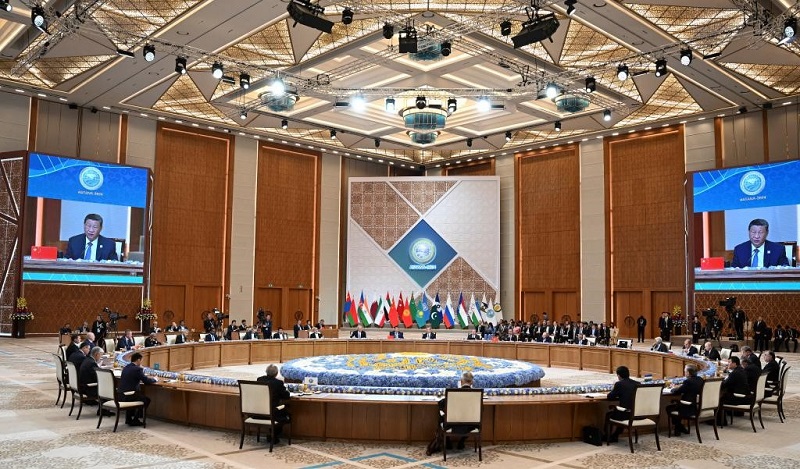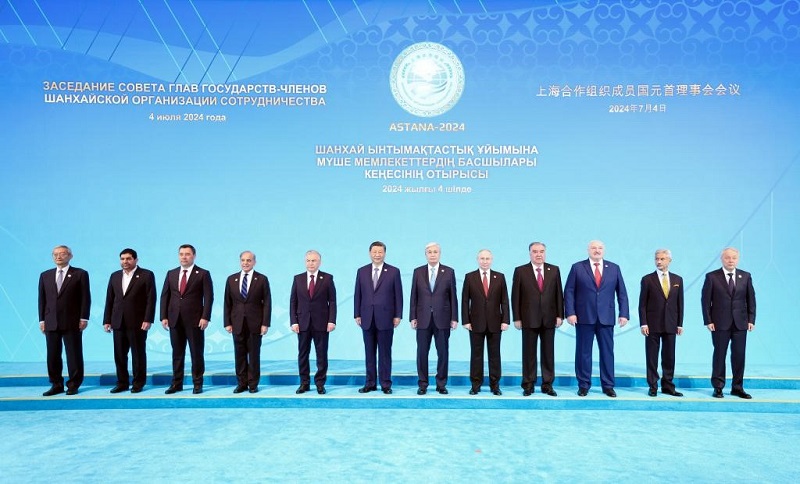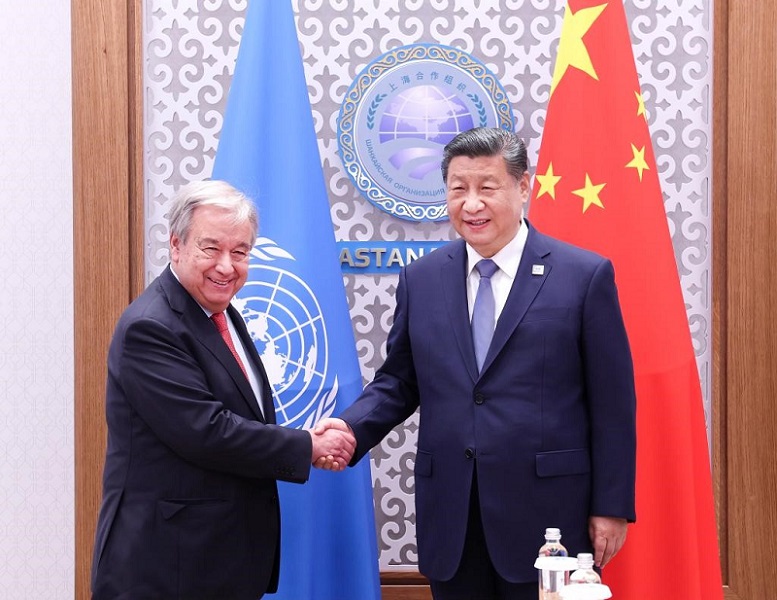President Xi Jinping reiterates China’s commitment to cooperation and multilateralism at SCO Summit.
On July 4, Chinese President Xi Jinping attended the expanded meeting of the Shanghai Cooperation Organization (SCO), or SCO+ at the Independence Palace in Astana, Kazakhstan, calling for building a common home featuring solidarity and mutual trust, peace and tranquility, prosperity and development, good-neighborliness and friendship, as well as fairness and justice. Over the past two decades, guided by the Shanghai Spirit – mutual trust, mutual benefit, equality, consultation, respect for cultural diversity and pursuit of common development – the SCO has promoted regional cooperation and championed multilateralism in a changing world.

Chinese President Xi Jinping attends the 24th Meeting of the Council of Heads of State of the Shanghai Cooperation Organization (SCO) at the Independence Palace in Astana, Kazakhstan, July 4, 2024. (Xinhua/Xie Huanchi)
Common Values
In his speech, Xi said the SCO was established at the turn of the century when the confrontations and divisions in the aftermath of the Cold War were yet to be resolved. “The founding members of the organization made a historic decision to pursue peaceful development, commit to good neighborliness and friendship, and build a new type of international relations. The Shanghai Spirit has become the shared values and guidelines for action among the member countries,” he said. Today, “the SCO stands on the right side of history, fairness and justice, and is of great significance to the world.”
Established by China, Russia, Kazakhstan, Kyrgyzstan, Tajikistan, and Uzbekistan on June 15, 2001, the SCO is a comprehensive regional cooperation organization that covers the largest area and population in the world. The Shanghai Spirit is the common value shared by the group.
Xi has repeatedly stressed the importance of the Shanghai Spirit. For example, last year, he told the 23rd meeting of the Council of Heads of State of the SCO, “The concept of a community with a shared future for mankind has gained extensive recognition and support from the international community and has been transforming from an idea to action and a vision to reality.” He then stressed, “At the forefront of this trend is the SCO, upholding this very concept and the Shanghai Spirit to build an SCO community with a shared future.”
The SCO has evolved from a regional organization focusing on security cooperation to one with growing global influence. From the original six, its memebership has expanded to 10. This year, for the first time, the summit was held in the format of a “Meeting of the Council of Heads of State of the SCO” and an “SCO Plus” meeting with the inclusion of Belarus.
In the face of new challenges such as regional conflicts and faltering global economic recovery, upholding the Shanghai Spirit has become even more relevant. Xi said in Astana, “To cope with this major transformation, the key is to have the wisdom to see the changes, the ability to deal with the changes, and the courage to make changes… We need to bear in mind that we live in a community with a shared future and always uphold the Shanghai Spirit.”
He made five proposals: to build a common home of solidarity and mutual trust, peace and tranquility, prosperity and development, good-neighborliness and friendship, and fairness and justice. He also detailed some concrete measures to deal with the challenges, including providing training in digital technology to at least 1,000 people from other SCO countries in the next three years. “China will work with SCO partners in the spirit of solidarity and cooperation and join hands with more countries and international organizations that identify with the Shanghai Spirit to strive for common progress and foster brighter prospects for a community with a shared future for mankind,” he promised.
Xi’s remarks have been endorsed by international experts. According to Xinhua, Aliya Mussabekova, an expert from the Kazakhstan Institute for Strategic Studies, said, “In the face of challenges such as geopolitical turbulence, the SCO should continue to uphold the Shanghai Spirit, further enhance the organization’s cohesion, and promote the development of global governance in a more just and equitable direction.”
Vasily Kashin, director of the Centre for Comprehensive European and International Studies of the HSE University in Moscow, Russia, said: “In the face of the accelerated evolution of the world order, it is hoped that the SCO will continue to uphold the Shanghai Spirit and inject positive energy into maintaining lasting peace and common prosperity in the region and the world.”

Chinese President Xi Jinping poses for a group photo with leaders attending the 24th Meeting of the Council of Heads of State of the Shanghai Cooperation Organization (SCO) at the Independence Palace in Astana, Kazakhstan, July 4, 2024. (Xinhua/Ju Peng)
BRI Cooperation
The Shanghai Spirit has helped boost cooperation between the SCO countries, extending from security to other areas, especially the economy. According to a trade development report on the 20th anniversary of the SCO in 2022, the value of trade among SCO member states increased nearly 100 times over 20 years, with their share of global trade rising from 5.4 percent in 2001 to 17.5 percent in 2020, demonstrating the SCO’s expanding influence on global trade.
The Belt and Road Initiative (BRI) has played an important role in promoting SCO economic cooperation. Xi proposed building a “Silk Road Economic Belt,” the overland arm of the BRI, during his visit to Kazakhstan in September 2013. It received a positive response from SCO member states and was included in the SCO’s economic cooperation agenda. Subsequently, cooperation among SCO countries began to focus on the economy. Since then, the BRI has empowered the development of the SCO.
On June 6, 2024, a trilateral intergovernmental agreement was signed between China, Kyrgyzstan, and Uzbekistan for a transborder strategic project of rail connectivity between China and Central Asia, which will be a landmark Belt and Road cooperation project among the three countries. The China-Kyrgyzstan-Uzbekistan Railway will start from Kashgar in China’s Xinjiang Uygur Autonomous Region, then run through Kyrgyzstan into Uzbekistan. In the future, it can be extended to West Asia and South Asia. The railway will enhance connectivity among the three countries and drive faster economic and social development in the region.
Xi said, “China is ready to make continuous efforts with Kyrgyzstan and Uzbekistan to lay the groundwork for the launch of the project and finish building this strategic corridor at an early date to bring benefits to the three countries and peoples and boost the economic and social development of the region.”
Zhao Xiao, Chinese Ambassador to Kazakhstan, told CCTV that the SCO is an important platform for jointly building the BRI. “The practical cooperation within the SCO not only promotes economic development and improves the livelihoods of the member states but also provides significant support for the continuous upgrading of the BRI cooperation.”
As more countries join the SCO, the economic ties among member countries through the BRI cooperation will be further enhanced.

Chinese President Xi Jinping meets with UN Secretary-General Antonio Guterres on the sidelines of the 24th Meeting of the Council of Heads of State of the Shanghai Cooperation Organization in Astana, Kazakhstan, July 4, 2024. (Xinhua/Pang Xinglei)
Upholding Multilateralism
As the SCO involves diverse cultures and civilizations, upholding multilateralism is crucial to its future development. Xi said, “We should jointly advocate an equal and orderly multipolar world and a universally beneficial and inclusive economic globalization, practice true multilateralism, and make global governance more just and equitable.”
At the SCO Summit in China’s port city Qingdao in 2018, Xi had called on SCO countries to work closely to build an SCO community with a shared future. In the Qingdao Declaration, the SCO members embraced “building a community with a shared future for humanity” as their most important political consensus and the goal for their future efforts.
With some countries opting for unilateralism and protectionism today, the successful experience of the SCO has proven the value of multilateralism and open cooperation. As Xi said, “When confronting the real threat of Cold War mentality, we should safeguard the bottom line of security; when facing the real risks of ‘small yard, high fence,’ we should protect the right to development; when encountering the real challenges of interference and division, we should consolidate the strength of unity.”
During his meetings with other leaders on the sidelines of the Astana SCO Summit, Xi affirmed China’s commitment to multilateralism in a turbulent world. He told Russian President Vladimir Putin that China looks forward to working with Russia and other member states to promote the steady and long-term development of the SCO and build an even closer SCO community with a shared future.
When meeting UN Secretary-General Antonio Guterres, he said, “No matter how the international situation changes, China always adheres to genuine multilateralism and supports the United Nations in playing a central role in international affairs.” In reply, Guterres thanked China for supporting the cause of the United Nations, practicing multilateralism, and playing a key and constructive role in promoting world peace and development.
Twenty-three years ago, when the SCO was established following the end of the Cold War, it aimed to jointly maintain regional peace, security, and stability. Now, as the world is undergoing new changes and challenges, it’s becoming more meaningful for the organization to pursue its original aspiration.